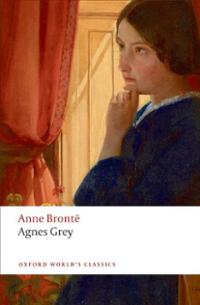Anne Brontë: Agnes Grey

Probably everyone who has at least a tiny bit of interest in 19th century English fiction is familiar with Charlotte Brontë's Jane Eyre and Emily Brontë's Wuthering Heights. Compared to her sisters, Anne Brontë seems to be a bit slighted. I haven't read any of her books either before reading Agnes Grey – and now I think she doesn't deserve the relative neglect she suffers beside her more famous sisters, because this is an excellent novel.
The semi-autobiographical novel tells the story of Agnes, the daughter of a poverty-stricken clergyman. She grows up in a loving and nurturing family, and her mother and sisters spare her in every possible way. Agnes, however, would like to contribute to the family budget and she would also like to see if she can stand on her own in the world so she decides to become a governess. She quickly fails in her first position, but she keeps her second one for several years, and while she tries to teach her spoiled, reckless, irresponsible and flirtatious young pupils how to be wise and moral, she also learns a lot about worldly life, and tender feelings arise in her bosom when she gets acquainted with the new curate of the village, Edward Weston.
Their relationship at first appears to be doomed, since Agnes is only a shy and neglected employee of a wealthy family, while Weston is a confident, popular and very manly man. Moreover, one of Agnes' pupils also tries to capture to attentions of the curate, so it seems hopeless that Agnes' gentle emotions will ever be reciprocated...
If I try to compare Anne Brontë's novel to her sisters' books, I don't get too far. Agnes Grey lacks the wild, life-altering passions so abundant in Wuthering Heights, and it also lacks the outspokenness and the modern-and-gothic quality which characterizes Jane Eyre. Anne Brontë's novel reminds me more of Jane Austen's novels: she depicts a society where the fate of a woman is never an easy one, and where the heroine has to defeat several unscrupulous and scheming adversaries to reach the safe haven of marriage. But in Agnes Grey, there's never any doubt that the enduring and virtuous heroine will finally win the man she desires, and the wicked adversaries will be duly punished.
Besides the very interesting portrait of society Anne Brontë gives in this novel, the author's nice and easy sense of humor and irony is also worth mentioning. The first part of the book – which deals with Agnes' family background and her first experiences as a governess – is especially entertaining. For instance, the naive Agnes believes that it's enough for her to recall her own childhood to be able to deal with every child – however, it soon turns out that this is not the case: she is unable to discipline the children in her care. So her fate is hardly enviable, and she often has a hard time with her pupils – still, it's nearly impossible to take her difficulties too seriously since the tone and style of the novel make it obvious from the very beginning that this is a story which must end well.
But despite the happy-end (which is really easy to foresee, so I don't think I'm giving you any spoilers here), this novel is far from being a sentimental love story. True, Agnes is a bit naive, but she's also very level-headed and she refrains from any extremes, so she's far from being a hysterical drama queen. And her modest and graceful behavior, her kindness and her tendency to be self-critical make her a very likeable heroine – and I definitely like to read about the good fortune of likeable heroines.
The semi-autobiographical novel tells the story of Agnes, the daughter of a poverty-stricken clergyman. She grows up in a loving and nurturing family, and her mother and sisters spare her in every possible way. Agnes, however, would like to contribute to the family budget and she would also like to see if she can stand on her own in the world so she decides to become a governess. She quickly fails in her first position, but she keeps her second one for several years, and while she tries to teach her spoiled, reckless, irresponsible and flirtatious young pupils how to be wise and moral, she also learns a lot about worldly life, and tender feelings arise in her bosom when she gets acquainted with the new curate of the village, Edward Weston.
Their relationship at first appears to be doomed, since Agnes is only a shy and neglected employee of a wealthy family, while Weston is a confident, popular and very manly man. Moreover, one of Agnes' pupils also tries to capture to attentions of the curate, so it seems hopeless that Agnes' gentle emotions will ever be reciprocated...
If I try to compare Anne Brontë's novel to her sisters' books, I don't get too far. Agnes Grey lacks the wild, life-altering passions so abundant in Wuthering Heights, and it also lacks the outspokenness and the modern-and-gothic quality which characterizes Jane Eyre. Anne Brontë's novel reminds me more of Jane Austen's novels: she depicts a society where the fate of a woman is never an easy one, and where the heroine has to defeat several unscrupulous and scheming adversaries to reach the safe haven of marriage. But in Agnes Grey, there's never any doubt that the enduring and virtuous heroine will finally win the man she desires, and the wicked adversaries will be duly punished.
Besides the very interesting portrait of society Anne Brontë gives in this novel, the author's nice and easy sense of humor and irony is also worth mentioning. The first part of the book – which deals with Agnes' family background and her first experiences as a governess – is especially entertaining. For instance, the naive Agnes believes that it's enough for her to recall her own childhood to be able to deal with every child – however, it soon turns out that this is not the case: she is unable to discipline the children in her care. So her fate is hardly enviable, and she often has a hard time with her pupils – still, it's nearly impossible to take her difficulties too seriously since the tone and style of the novel make it obvious from the very beginning that this is a story which must end well.
But despite the happy-end (which is really easy to foresee, so I don't think I'm giving you any spoilers here), this novel is far from being a sentimental love story. True, Agnes is a bit naive, but she's also very level-headed and she refrains from any extremes, so she's far from being a hysterical drama queen. And her modest and graceful behavior, her kindness and her tendency to be self-critical make her a very likeable heroine – and I definitely like to read about the good fortune of likeable heroines.





